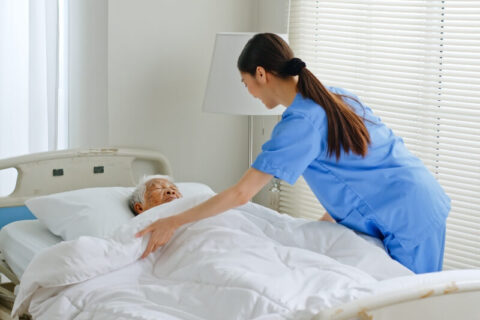Will Hospice Provide a Hospital Bed?
Will hospice provide a hospital bed?
When a patient and his or her family contract for home hospice services, the hospice team will bring necessary equipment and medication to the patient’s home, in order to provide appropriate care. Will hospice provide a hospital bed? In most cases, yes. It is common for the hospice organization to provide the patient with a hospital bed, sometimes replacing the patient’s own bed, depending on the type of care that is required. Generally, a twin-sized bed, a hospital bed can be raised and lowered, and has a moveable head and foot. Hospital beds are also equipped with adjustable bed rails, and they can have wheels, to make it easier for them to be moved when necessary.
Why do hospice patients need a hospital bed?
The primary reason a hospital bed is provided is to make caring for the patient easier for the hospice staff. Here are some of the ways in which hospital beds are beneficial.
- Hospital beds reduce the patient’s risk of falling. Having adjustable side rails can prevent the patient from falling out of bed, as well as providing something stable for a patient to hold onto while getting in and out of bed. This is especially important for elderly patients and those with mobility issues or difficulty getting up. Being able to lower the bed is helpful, too, and is typically done with the patient is sleeping or when it is challenging for the patient to get out of bed. Lowering the bed reduces the risk of damage if a patient should fall out while asleep and reduces the risk of the patient falling when exiting the bed.
- A caregiver can more easily assist the patient when the bed is adjustable. A hospital bed can help the caregiver reach the patient without standing in an abnormal position that could strain the back. Because caregivers provide services like changing the linens, giving a patient a bed shower, and repositioning the patient, it is helpful to have a bed that can be adjusted to facilitate these things. Hospice home health aides and CNAs are trained to move or transfer a patient using the correct body mechanics, asking the patient to assist when possible. Even if a patient is not ambulatory, he or she may have the upper body strength necessary to assist in repositioning, which is helpful to the caretaker.
- The mattresses used in hospital beds can help prevent bed sores and ulcers. This type of mattress, called an alternate pressure mattress, has a series of air-filled chambers. Air pressure within these chambers moves frequently to relieve pressure from different parts of the body, which is good for hospice patients who are at high risk of pressure ulcers because of an inability to move on their own or reliance on a ventilator.
- Certain types of medical conditions require hospital beds. Some hospice patients may need to be positioned in a way that is not possible with a standard bed. A patient who needs his or head raised more than 30 degrees because of problems with aspiration, congestive heart failure, or chronic pulmonary disease, for instance, will be better able to maintain this position with an adjustable hospital bed. Because hospice beds are made with the safety and health of the patient in mind, they are a better choice for hospice patients than a typical, traditional bed. Some patients who require head elevation when sleeping or sitting choose to use a recliner, but a hospital bed is a much more comfortable and safer option. In addition to allowing for proper positioning, an electric hospital bed can help to promote optimal blood circulation.
What is the key takeaway from all of this?
Home hospice care is beneficial for people who have advanced medical needs but prefer to remain in familiar surroundings. However, the home environment is not likely to have furniture that is designed to help caretakers meet these needs. Hospice care providers will bring a hospital bed into a patient’s home in order to mitigate the difficulties of providing care at home, especially when patients have limited mobility. By preventing falls, assisting the caregiver, reducing the risk of ulcers, and helping with some medical conditions, a hospital bed placed in a patient’s home facilitates appropriate and effective care. While patients might have some initial resistance to using a hospital bed instead of their usual beds, the use of hospital beds should be embraced, if only because it allows patients to remain at home while receiving the treatment, they need to address their health issues.
For Questions about Hospice, Contact Agape Hospice NW
If you are looking for compassionate hospice care for your loved one, Agape Hospice NW is a wonderful option. Accredited by The Joint Commission, Agape strives to help our patients to live the remainder of their lives to the fullest, by improving quality of life not only for our patients but also for their families. The Joint Commission is nationally recognized as the gold standard in health care, and Agape has met the organization’s enhanced requirements for patient safety and quality of care. We provide social workers, spiritual counselors, volunteers, bereavement counselors, and certified hospice aides, all under the direction of a medical director who is responsible for ensuring that the patient’s wishes are honored, and each patient is receiving the highest level of care. We also provide registered nurses experienced in helping during this emotional time, as well as assessing the needs of the patient. For more information about how we can help, call 503-628-9595 or contact us through our website.


